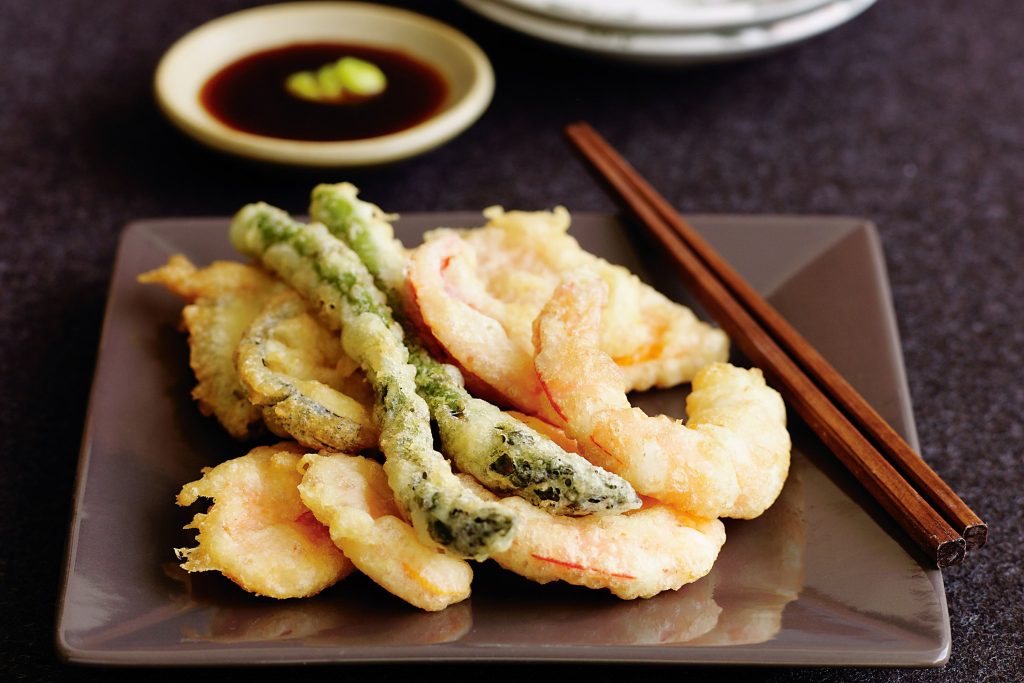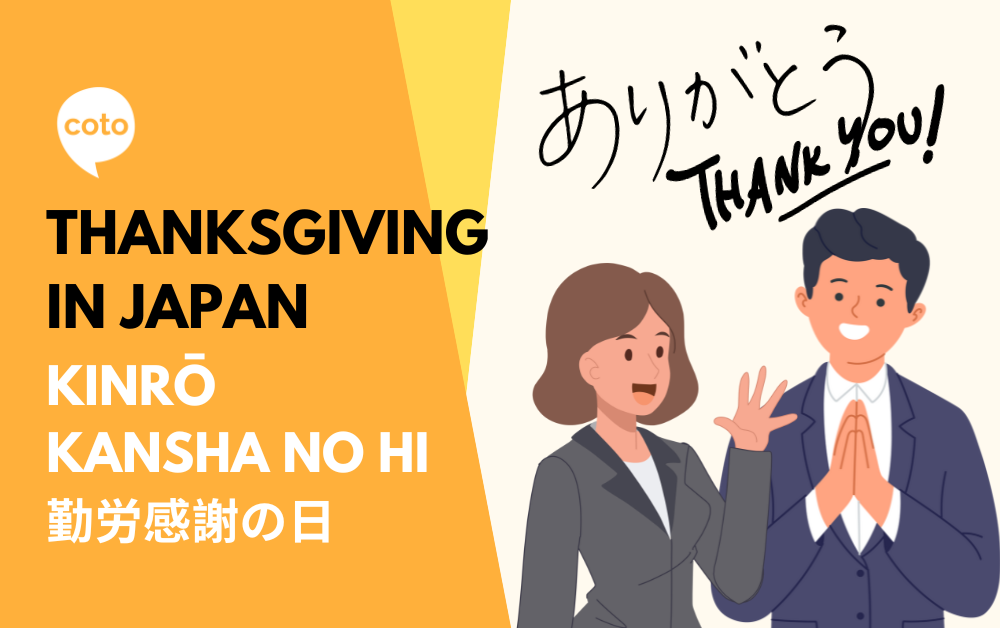Thanksgiving is a time for giving thanks for the blessings in our lives. When discussing Thanksgiving, we usually think of the American style, where family and friends celebrate this day together by holding a turkey and pumpkin pie feast. But did you know Japan has a similar celebration?
In Japan, this gratitude is expressed during 勤労感謝の日 (Kinrō Kansha no Hi) or Labor Thanksgiving Day. Celebrated on November 23rd, this national holiday honors workers’ hard work and dedication across all industries.
A Quick Jump To…
- The Origins of Kinrō Kansha no Hi
- The Evolution of Kinrō Kansha no Hi
- How Kinrō Kansha no Hi is Celebrated
- Traditional Japanese Dishes on Kinrō Kansha no Hi
- Expressing Gratitude on Kinrō Kansha no Hi
- Difference between American and Japanese Thanksgiving Day
- American Thanksgiving-Style Meals in Japan
- FAQ
The Origins of Kinrō Kansha no Hi
Kinrō Kansha no Hi traces its roots back to ancient harvest festivals, where communities would gather to express appreciation for the bountiful crops. These celebrations were often accompanied by music, dance, and feasting, and they served as a way for people to connect with the natural world.
The Evolution of Kinrō Kansha no Hi
Over time, these harvest festivals evolved to encompass gratitude for all forms of labor. As Japan developed into a modern industrialized nation, the role of workers became increasingly important. In 1947, the Japanese government officially designated November 23rd as Labor Thanksgiving Day in recognition of workers’ vital contributions to the country’s economy and society.
How Kinrō Kansha no Hi is Celebrated
Today, Kinrō Kansha no Hi is a national holiday in Japan, and it is celebrated in a variety of ways. Schools hold special events to teach children about the importance of labor and appreciation, and workplaces often organize events for their employees. Many people also take the opportunity to visit family and friends and express their gratitude for their loved ones. Ozmall has gathered events during Kinrō Kansha no Hi; go check it out!
Traditional Japanese Dishes on Kinrō Kansha no Hi
While Kinrō Kansha no Hi is not typically celebrated with a traditional Thanksgiving feast, many Japanese families enjoy special meals on this day. Some traditional Japanese dishes that are often served on Kinrō Kansha no Hi include:
- 刺身 (Sashimi): Thinly sliced raw fish
- 天麩羅 (Tempura): Battered and deep-fried seafood or vegetables
- 寿司 (Sushi): Vinegared rice topped with a variety of ingredients, such as seafood, vegetables, and omelet
- うどん (Udon): Thick wheat noodles in a hot broth
- もち (Mochi): Sweet rice cakes





Expressing Gratitude on Kinrō Kansha no Hi
There are many ways to express gratitude on Kinrō Kansha no Hi. Some people make cards or gifts for workers in their communities, such as police officers, firefighters, and teachers. Others simply take the time to thank someone who has made a difference in their lives.
Some Phrases You Can Use To Show Your Gratitude In Japanese!
- ありがとうございます Arigatō gozaimasu Thank you
- 本当にありがとうございます Hontōni arigatō gozaimasu Thank you so much
- どうもありがとうございます Dōmo arigatō gozaimasu Thank you very much
- お疲れ様でした Otsukaresamadeshita Thank you for your hard work
- いろいろありがとうございました Iroiro arigatō gozaimashita Thank you for everything
What is the difference between American and Japanese Thanksgiving Day?
Here is a table summarizing the key differences between Thanksgiving in the United States and Labor Thanksgiving Day in Japan:
| Feature | Thanksgiving in the United States | Labor Thanksgiving Day in Japan |
| Date | Fourth Thursday of November | November 23rd |
| Origins | Harvest festival celebrated by Pilgrims and Native Americans in 1621 | Ancient harvest festivals and the Meiji Restoration (1868-1912) |
| Focus | Giving thanks for blessings in life | Honoring the hard work and dedication of workers |
| Food | Traditional Thanksgiving meal featuring turkey, stuffing, mashed potatoes, gravy, cranberry sauce, and pumpkin pie | Lighter meal featuring sashimi, tempura, sushi, udon, and mochi |
| Activities | Large family gatherings, football games, annd parades | Large family gatherings, football games, and parades |
Bonus! Finding American Thanksgiving-Style Meals in Japan
If you feel nostalgic and want to recall the taste of an American-style Thanksgiving meal or try it out of curiosity, we’ve got you! The influence of American culture has led to a growing demand for Thanksgiving-style meals in Japan. Several restaurants in major cities offer turkey dinners with all the trimmings, while some international grocery stores stock Thanksgiving ingredients for those who prefer to cook at home.
Here are some places that we love!
- Soul Food House at Azabujuban
- The Oak Door at Grand Hyatt Tokyo
- BLT STEAK at Roppongi
- Empire Steak House at Roppongi
Here’s our other blog: Where to Enjoy American-style Thanksgiving in Tokyo, which has more detailed information on where you should go to celebrate your Thanksgiving break!
You Might Be Wondering…
More Details on “What is the difference between American and Japanese Thanksgiving Day?”
While Thanksgiving is celebrated in both the United States and Japan, there are some key differences between the two celebrations.
Date
The most obvious difference is the date on which the holiday is celebrated. Thanksgiving in the United States is celebrated on the fourth Thursday of November, while Labor Thanksgiving Day in Japan is celebrated on November 23rd each year.
Origins
Thanksgiving in the United States has its roots in a harvest festival celebrated by the Pilgrims and Native Americans in 1621. Labor Thanksgiving Day in Japan has its roots in ancient harvest festivals and the Meiji Restoration, a period of modernization in Japan from 1868 to 1912.
Focus
Thanksgiving in the United States focuses on giving thanks for the blessings in life, such as family, friends, and good health. Labor Thanksgiving Day in Japan is focused on honoring workers’ hard work and dedication.
Food
The traditional Thanksgiving meal in the United States is a large feast featuring turkey, stuffing, mashed potatoes, gravy, cranberry sauce, and pumpkin pie. The traditional Labor Thanksgiving Day meal in Japan is lighter, featuring smaller portions of sashimi, tempura, sushi, udon, and mochi.
Activities
Americans typically celebrate Thanksgiving with large family gatherings, watching football games, and going to parades. Japanese people usually celebrate Labor Thanksgiving Day by spending time with family and friends, giving thanks to their loved ones and colleagues, and attending special events held at schools and workplaces.
